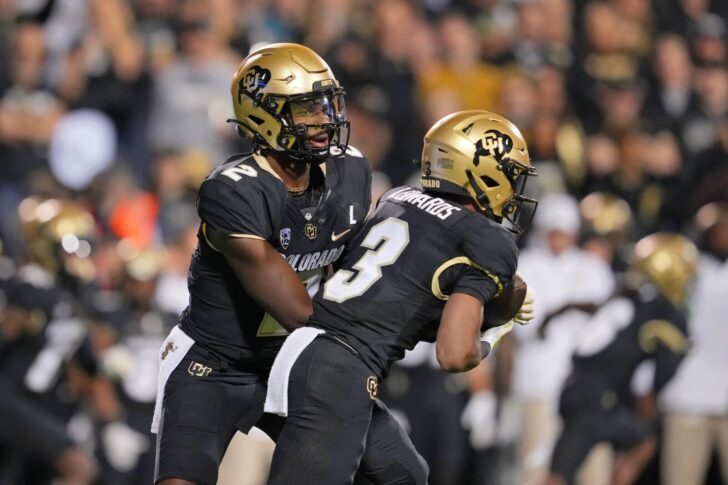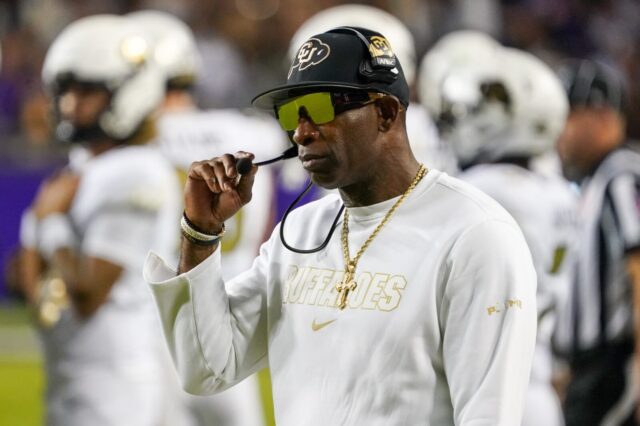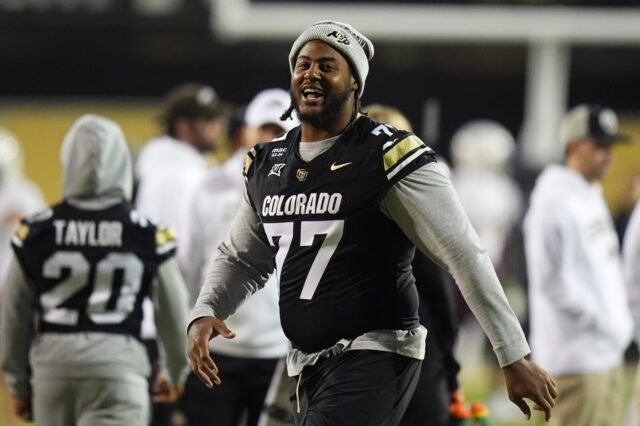After an embarrassing, 42-6 drubbing at Oregon last week that dropped them from the nation’s Top-25 rankings, the Colorado Buffaloes had hard lessons to learn, and not much time to do so. This weekend, they’ll at least be in the familiar confines of Boulder’s Folsom Field, but their opponent might be even more dangerous. The eighth-ranked USC Trojans, led by defending Heisman Trophy winner Caleb Williams, average an incredible 55.0 points per game, leading the nation by exactly one point over ninth-ranked Oregon. Injuries to cornerback Travis Hunter and cornerback Shilo Sanders will make Williams and the Trojan offense even more difficult to stop, meaning that the Buffaloes will have do something that they haven’t done yet this season if they’re to keep Saturday’s game within reach.
When the Buffaloes have the ball
Quarterback Shedeur Sanders has the numbers (1,410 yards, 11 touchdowns and 1 interception) to be considered among the nation’s best signal-callers, but he’s been sacked 22 times this season for a loss of 196 yards; an average of 5.5 sacks for -49 yards… per game. While Sanders’ accuracy (76.9 percent on the season) doesn’t seem to suffer for it, his health eventually might — and the Buffs constantly play right into the defense’s hands by finding themselves in third-and-long situations far too often. Without two-way star Hunter at wide receiver, Colorado isn’t quite dangerous enough to convert enough of those long plays. No offense is.
The fix, of course, is to avoid being third-and-longs in the first place — and that means that the running game needs to take center stage. Not only will it help Sanders and the offense, it’ll help the Buffaloes’ defense by keeping Williams and Co. off the field as much as possible. Freshman Dylan Edwards (28 carries for 157 yards and a 5.6 yards-per-carry average) leads the way, but the team has high hopes for former Big 12 Freshman of the Year Alton McCaskill, who made his return from knee surgery in Oregon with five carries and 17 yards. McCaskill, who ran for 961 yards and 16 touchdowns in 2021 for the university of Houston, could change the dynamics of the running game… if he’s healthy enough. They need him; the Buffaloes are dead last in the country on the ground, averaging a paltry 55.8 yards per game.
Colorado’s weakest part of the roster is on the line of scrimmage, and on the offensive side of things, they’ll get a a bit of break from last week; Oregon ranks 11th in the nation in yards allowed, but Southern Cal ranks 70th overall and 75th against the run. If the Buffs can be consistently effective on the ground, they’ll stand a puncher’s chance agains the Trojans at home, but if Sanders has to carry the team through the air again, it’s worth noting that USC’s 4.0 sacks per game ranks them third-best in the country. That’s a recipe for disaster.
When the Trojans have the ball
Calling Caleb Williams “elite” is probably selling him short. A generational talent, Williams leads the nation in passing efficiency rating (223.07), ranks second in touchdown passes with 15, and has yet to throw an interception. He rarely makes costly mistakes, and since the Buffs’ defensive line hasn’t been able to bring consistent pressure at any point in the season, Williams is likely to have his way with a shorthanded Colorado secondary. Former Buffalo Brendan Rice is Williams top touchdown target, leading the Trojans with five. Receivers Tajh Washington and Dorian Singer, receiver/returner extraordinaire Zachariah Branch (2), and receivers Duce Robinson and Michael Jackson III, along with tight end Lake McRee (1) all have touchdowns on the season.
Quite frankly, the Buffs won’t be able to stop USC’s passing attack; the best they can realistically hope for is a game-changing turnover. Fortunately, Colorado’s seven interceptions is good for fifth-best in the country… but Hunter and Sanders each had one of those.
Unlike the Buffaloes, the Trojans’ offense is plenty effective on the ground; their 192.0 yards per game ranks 35th in the nation behind 5’9″, 210-pound junior MarShawn Lloyd, who already has 349 rushing yards and a pair of touchdowns to go along with a gaudy 8.9 yards-per-carry average. Austin Jones (142-3-8.4) and Quinten Joyner (113-1-8.1) each chew up yards in chunks, and Williams is no slouch himself — his three rushing touchdowns is tied for the team lead.
There are reasons why USC’s scores the most points in college football, and unfortunately for Colorado, they’re not yet equipped to handle this caliber of offense. If they can somehow slow Williams down through the air, they can keep the score down. It’s not an ideal option, to be sure… but it’s the best one the Buffs have got.
What if?
The Buffaloes were three-touchdown underdogs on the road in Eugene, Ore. last week, and rightly so. They’re even bigger underdogs at home this Saturday against the Trojans. To even stand a chance of winning, the Buffs have to play mistake-free football, play their best game of the season on both the offensive and defensive lines, likely cover for the absence of their two best defensive players, and have their nation’s worst running game humming along against a Top-10 team.
In other words, expect a nationally-televised loss for the second consecutive week. That said, simply due to USC’s weaknesses in comparison to Oregon’s, though the Trojans are the better team, the Buffaloes have a better chance to pull of the upset of the season — again — this week than they did the week prior. Colorado will find themselves energized by a raucous home crowd, and if they start fast, anything is possible.
A little perspective won’t hurt, either. No matter the result, the Buffaloes will be no worse than 3-2 after playing three ranked teams in their first five games after a 1-11 season last fall. “The Prime Effect” is real, and the networks know it — more than 35 million people have watched the Buffaloes on television this season, and on Saturday, they’ll add as many as 10 million more. The program’s rise is real, too — and even a lopsided loss on Saturday won’t change that.



